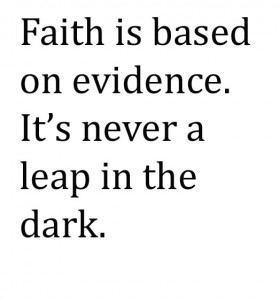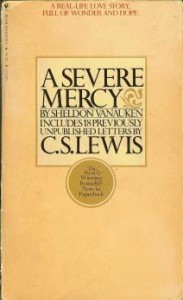The Paradox of the Trinity
John 1.2: “He was with God in the beginning…”
As far as people who aren’t believers in Christ, here we come to one of the most baffling, and laughable, claims of all the things Christians believe: The Trinity. Christians say that Jesus is God with no difference between them—they are one in the same being (John 10.30); and then out of the other side of their mouths they say that Jesus is the Son, a separate person from the Father, and they are different beings (Jn. 1.2). We might as well be saying that summer is winter, right?
 When pressed on it, they fall back on, “It’s an eternal mystery. We just have to have faith.”
When pressed on it, they fall back on, “It’s an eternal mystery. We just have to have faith.”
Well, we all know that faith is based on evidence. It’s never a leap in the dark, but a calculated attitude and subsequent behavior grounded in solid evidence. Now, if we’re talking about things (material stuff), then of course it’s impossible. But since we’re talking about an organic living thing, the gap to understanding shrinks immeasurably.
The evidence of the Trinity is Jesus Himself. The things he did are things that only God could do: heal blind eyes, walk on water, make thousands upon thousands of loaves of bread come out of a single loaf—that sort of thing. Jesus did hundreds, if not thousands, of such things. And he said he is God. But we also know that a voice came from heaven while he was in the water being baptized, and another one on the Mount of Transfiguration. So we have to figure out a way to put this together and make sense of it.
Many people have tried:
- Water, ice, and vapor. All H2O, but all different.
- An egg of shell, yolk, and white
- The three dimensions by which we understand space
 These are all noble attempts, but the one I like best comes from A Severe Mercy by Sheldon Vanauken (pp. 113-114). He and his wife, Davy, are the characters in the excerpt that follows.
These are all noble attempts, but the one I like best comes from A Severe Mercy by Sheldon Vanauken (pp. 113-114). He and his wife, Davy, are the characters in the excerpt that follows.
One afternoon Davy and I walked in the University Parks and Mesopotamia, talking of some day writing a novel, catching something of the extraordinary variety of Oxford life, including the Studio, a novel that we would put ourselves in as characters. Then, saying, “Some day, maybe,” we went to the Copper Kettle on the High for tea. That night, as usual, a couple of friends came by. One was Julian and the other was a non-Christian friend from Corpus Christi College named Richard, and it was Richard who wanted to talk about Christianity. After considerable talk, he said: “The thing that stumps me is the Trinity: The Trinity and, above all, the Incarnation. You all seem to believe that Jesus was, at the same time, completely a man—and completely God. In the name of common sense, how could he be? You Christians always take refuge in mysteries.”
“Not at all,” I said. “We aren’t hiding behind a mystery in this, at least.”
“Well,” said Richard. “Explain it in some way that makes sense.”
Julian began to say something about the Persons of God, and I could see that Richard wasn’t finding it very helpful. Then I thought of the novel Davy and I had been talking about and murmured to Davy, “I’ve got it!”
“It’s still no good,” said Richard when Julian had done.
“Look, Richard,” I said. “This afternoon Davy and I were talking about writing a novel of Oxford with the Studio in it, and us, and everybody. Now, assuming we could do it—”
“Assuming you could do it,” said Richard, “I’d buy a copy. Not more than five shillings, though.”
“Listen,” I said. “We’re talking about the Incarnation. Okay, suppose I write it—it’s too complicated with two authors—and I put myself in it. There I am, walking down the High, wearing a Jesus tie—in the book. And let’s say I make up a lot of characters, not using real people for fear of hurting their feelings. But I am in it, and I, the character, say whatever I would say in the various situations that occur in my plot.”
“What about the Incarnation?” said Richard.
“That’s what I’m telling you, stupid fellow,” I said with a grin. “Don’t you see? I am incarnate in my book. I am out here writing it, so I’m like God the Father. But it’s really me in the book, too, isn’t it? So that’s Jesus, the Son, right? The me in the book speaks my words—and yet they are speeches that I’ve probably never made in real life, not being in those situations. And yet can’t you see that it’s really me?”
“Um,” said Richard. “Yes, right. I see. Go on.”
“Well,” I said. “All right. I’m out here, being the Author of all things—and I’m in the book, taking part in scenes of ‘drammer’ Incarnate in my book. Now, the me in the book: he’s all me, isn’t he? And he’s all character, too, isn’t he? Like the doctrine: God and All man. It makes sense, doesn’t it? And one more thing: suppose the characters run away with the story—authors are always saying that that happens. It might be necessary, whatever I had originally intended, for me to get killed—um, crucified…Anyhow—you see?”
“You win,” said Richard. “It does make sense that way. I’ll have to think about it.”
“There’s something else, though,” said Davy. “The other characters—made-up ones. Invented ones. If Van invents characters, they’ll all, even the bad ones, have something of Van in them, won’t they? So, you see? We all have something of God in us—God’s spirit—but only the One, Jesus, is God Incarnate. But God’s Spirit in us…Well, that makes the Trinity, doesn’t it? God the Father, God the Son, and God the Holy Spirit. Actually, I’ve never seen it so clearly myself. More tea?”
It is possible to conceive of it. Adding the evidence to the logic, we can see the truth. But what does it matter to our culture that he was with God in the beginning? Only that if that is the case, then deity is being claimed for Jesus, and if that is not the case, then deity is not even a possibility, because he is a created being like everyone else. So this statement shows to be false the beliefs of our culture: that he was a good man, that he was a prophet, or that was a moral example or an exemplary teacher. This declaration claims deity for him by aligning him with Gn. 1.1 and being the “God” who created the heavens and the earth “in the beginning”.
Let me know what you think. Let’s talk about this. Always wanting to talk.